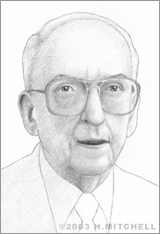Alfred Butts
After being laid off from his job at an architecture firm in 1931, Alfred Mosher Butts fell on hard times. He was out of work for quite some time when he decided to get creative. With his newfound spare time, he thought he would try to invent a game. He did some research and found that there were three basic types of games: those based on numbers, like cards or dice, board games, like checkers and chess, and games based on words and letters.
A lifelong crossword puzzle lover, Butts began working on a word game, first producing a game he called Lexiko. This game would be played by selecting nine letter tiles at random and forming words from them. He tried to sell the game to some established manufacturers, but he was rejected.
He continued to develop the game, decreasing the number of letter tiles drawn at a time to seven and adding a board that assigned point values to each letter based on how common its usage was in the English language. He called this version Criss-Cross Words. Again, no one was interested.
Later, Butts was re-hired by his architecture firm, but he continued to work on his game. It was developing a small following, selling in small quantities, and one of the players, James Brunot, was impressed. Brunot approached Butts about buying the rights to the game in 1947. Butts would receive royalties, but Brunot would manage the game’s production. He also made a few adjustments, adding new rules such as the 50-point rule for playing all seven tiles at once, changing the board colors, and calling the game “Scrabble.”

Brunot produced the first sets of Scrabble out of an abandoned schoolhouse that he rented with his wife in Dodgingtown, Connecticut, where he and friends made approximately 12 games per hour and stamped out letters on wood tiles, one at a time.
Scrabble sales lagged for a few years, but in 1952, the game got its “big break.” Macy’s ordered a large stock of the game and its popularity soared. In 1953, more than a million sets of Scrabble were sold, and 3.8 million sold the following year. Shortly thereafter, Brunot licensed Selchow & Righter Co. to market and distribute Scrabble in the United States and Canada. In 1972, Brunot sold the trademark for Scrabble to that company.
In 1986, Selchow & Righter was bought by Coleco Industries, which declared bankruptcy in 1989. That year, Hasbro Inc. bought Scrabble and other Coleco assets. Today, Scrabble ranks as the second best-selling game in U.S. history (just behind “Monopoly”). The game is even played competitively, with the first National Scrabble Championship tournament having taken place in 1978.
Butts died in 1993 and did not become rich from his invention, but he was able to enjoy the worldwide popularity of Scrabble, which continues to sell millions of sets worldwide each year in 29 different languages.


